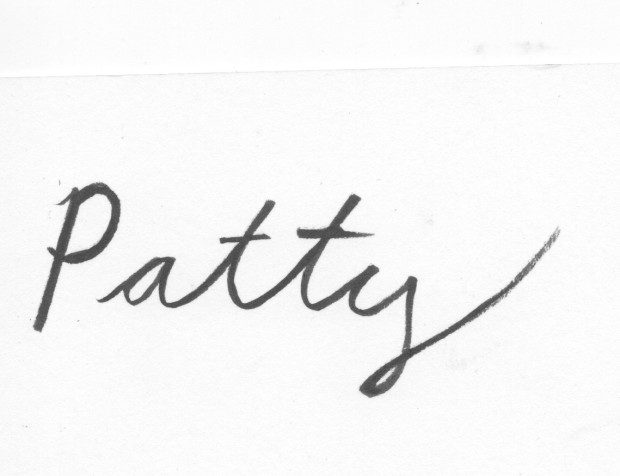Patty by Adrienne Thomas
SHE LOOKED A LITTLE like Patti Smith. I met her on the street around 11pm on a Wednesday night in Williamsburg. She was the connectivity cap to my day alone in this dazzling new world. I walked past her, but boldly called her back a few steps after to compliment her jumper. I hadn’t found the easy slice of cheese I’d gone looking for an hour earlier, and the cramp of my residual drunk sought some shifting. It was a floral and loose-strapped jumper that she wore. She was probably 60 or 65 years old with worn eyes and a wrinkled face. She was compelled by my compliment; I was interested in what we might talk about. We stood on the sidewalk for over an hour, discussing her career as a criminal journalist in New York City. We stood close and caring as she shared some of the most difficult cases and instances of power superseding justice that she had witnessed and exposed, and how these terribly frustrating experiences eventually led her to quit journalism. She was keen to my demeanor, my reactions to her stories, and my strong interest in her magnificent and messy life. I felt her love and big sorrow through these stories, these transparent emotions chained to her, heavy and unpredictable. Even in this hour with a stranger, we became close.
She washed away my Brooklyn shock with spells of admiration for me, an insecure 26-year-old from Brooklyn’s slower-moving, Midwestern cousin, Wicker Park. “That’s wonderful…”, “That’s it!”, “You’ve got it. You’re what people miss in this town.” She looked at me deep in the eyes and told me that my depth of thought and careful pace had immense value here in Brooklyn. Her advice was specific, simple, and poignant. It went something like this: “Whatever you do here, you have to give it your all. You have to show up, you have to not be late because someone else will take your spot in a blink. You have to give it everything, whatever it is that you want to do. You have to know what you want — but once you do, you gotta come back here and get it.” Her observations gave me a blushing boost and pounding strut that I carried with me for days. Patty revolted—tenderly, gently, intuitively—against my insecurities about life, people, careers, and competition in Brooklyn. Her influence and respectable command painted her a Fabulous Creature to me, someone streetwise and mystical like an aunt who’s always traveling or a tarot card reader from the old periphery. Her ideas I heard in tune, her voice was a yarn-sewn cable through which nothing fell lost in translation.

I think she caught a similar force from our meeting, too. Patty’s most compelling stories involved black murder and disgusting betrayals of police corruption. She was horrified while retelling these old and very personal accounts of failure, but she talked of them so naturally. I felt her passion for justice veining through her soul, gliding proudly through the sky despite the good work’s imperious dirt. I think she heard me strong when I told her that’s what I saw. By the end of it, it seemed clear to both of us that her career was not over, that it had to begin again. This is her life, her chosen love over love, the thing she chooses to talk about when someone asks her what she cares about in this world. I told her she had to continue this work, and we cried about the beauty of our crossing.
For a few weeks after, I felt convinced she was something magic. Maybe she actually was Patti Smith, I wondered with the same silly flutter that kept me up late as a young girl when my father would bring home lottery tickets. Our talk was the clean white drape over Brooklyn’s burnt-out mattress blocks. She was the only place, person, or idea that kept fear from striking me silent on that trip. To say our meeting was chance tastes like truffle on my scrambled memories, but the truth of it is, there exists no blanket of chance like that in our world. Not in Patty’s, not in mine, not in yours. If every moment that sparked life in us was a flick of matchstick chance, glowing long enough for us to navigate an inch through this dark and dimly world, than where does intuition come in? Is it a stubbed toe, or perhaps some lips still wet and breathing on our pillow? We attracted each other. We held an hour open for nothing in front of each other. We accepted and offered forces as though SIMS had SOULS and the cheat codes to connectivity lived in every sky we saw. We bathed in intention together, rejoicing for it had finally come out from hiding. If chance was our crutch, then this meant full recovery, because the world never looks as beautiful as when we paint the view.
******
Read the rest of this brilliance in Sheriff Nottingham 5: Groundhog Day – available on Amazon!

